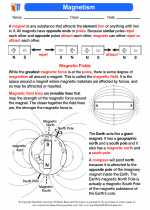Photosynthesis
Photosynthesis is the process by which green plants, algae, and some bacteria use sunlight to synthesize foods with the help of chlorophyll. It is the process that converts carbon dioxide and water into organic compounds, especially into glucose, and releases oxygen as a byproduct. This process is vital for life on Earth as it is the primary source of energy for nearly all organisms.
Key Concepts:
- Equation for Photosynthesis: The overall chemical reaction for photosynthesis can be represented as:
6CO2 + 6H2O + light energy → C6H12O6 + 6O2 - Chlorophyll: This is the green pigment found in the chloroplasts of plant cells. It is responsible for absorbing light energy during photosynthesis.
- Light-dependent and Light-independent Reactions: Photosynthesis consists of two main stages: the light-dependent reactions (occur in the thylakoid membranes) and the light-independent reactions (occur in the stroma of the chloroplast).
- Factors Affecting Photosynthesis: Light intensity, carbon dioxide concentration, and temperature can all affect the rate of photosynthesis.
- Importance of Photosynthesis: Photosynthesis is crucial for the production of oxygen, the source of food for plants and other organisms, and the basis of the carbon cycle.
Study Guide:
To gain a deeper understanding of photosynthesis, consider focusing on the following key areas for study:
- Memorize the chemical equation for photosynthesis and understand the reactants and products involved.
- Learn about the structure and function of chlorophyll in the process of photosynthesis.
- Understand the difference between the light-dependent and light-independent reactions of photosynthesis, and the substances involved in each stage.
- Explore the factors that can affect the rate of photosynthesis and how they impact the process.
- Recognize the importance of photosynthesis to life on Earth and its role in the ecosystem.
By focusing on these key concepts and study guide areas, you can develop a solid understanding of the process of photosynthesis and its significance in the natural world.
.◂Science Worksheets and Study Guides Sixth Grade. Magnetism
Study Guide Magnetism
Magnetism  Activity Lesson
Activity Lesson Magnetism
Magnetism  Worksheet/Answer key
Worksheet/Answer key Magnetism
Magnetism  Worksheet/Answer key
Worksheet/Answer key Magnetism
Magnetism  Worksheet/Answer key
Worksheet/Answer key Magnetism
Magnetism  Worksheet/Answer key
Worksheet/Answer key Magnetism
Magnetism  Vocabulary/Answer key
Vocabulary/Answer key Magnetism
Magnetism 

 Activity Lesson
Activity Lesson
 Worksheet/Answer key
Worksheet/Answer key
 Worksheet/Answer key
Worksheet/Answer key
 Worksheet/Answer key
Worksheet/Answer key
 Worksheet/Answer key
Worksheet/Answer key
 Vocabulary/Answer key
Vocabulary/Answer key

The resources above cover the following skills:
EARTH AND SPACE SCIENCE
Earth’s Systems
Develop and use models of Earth’s interior composition to illustrate the resulting magnetic field (e.g., magnetic poles) and to explain its measureable effects (e.g., protection from cosmic radiation).